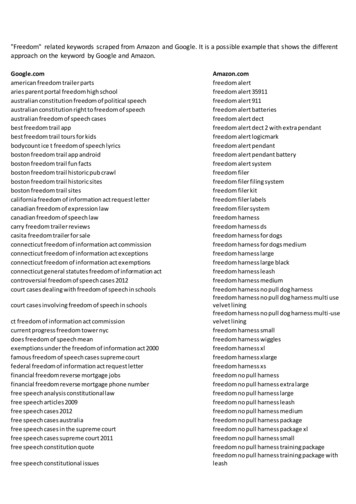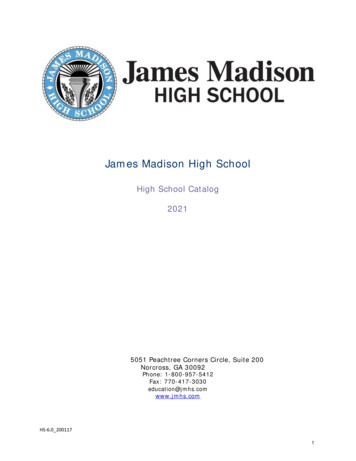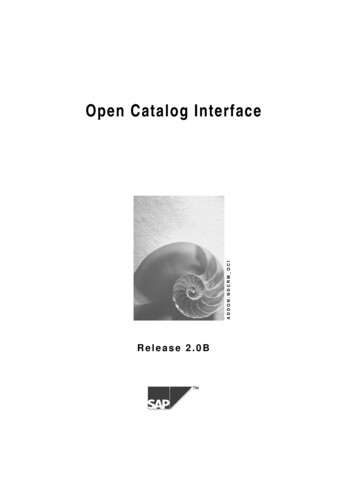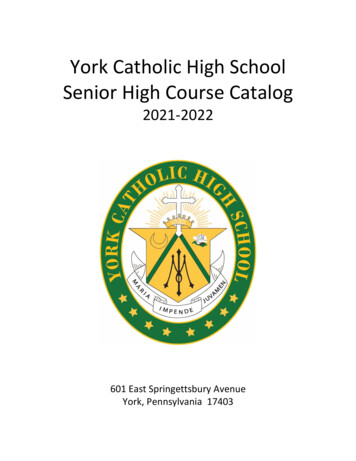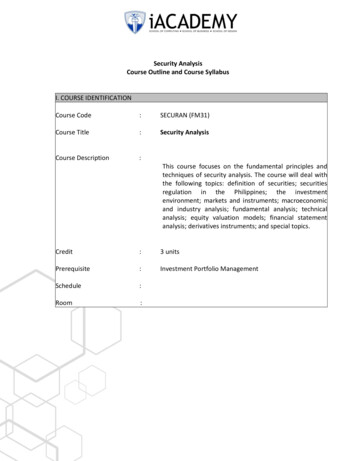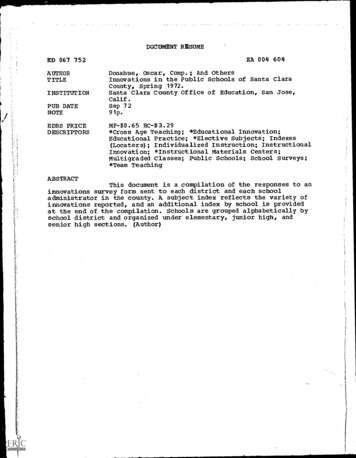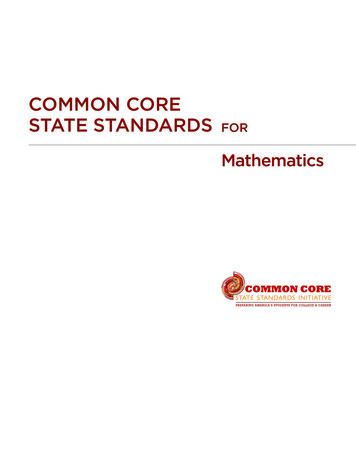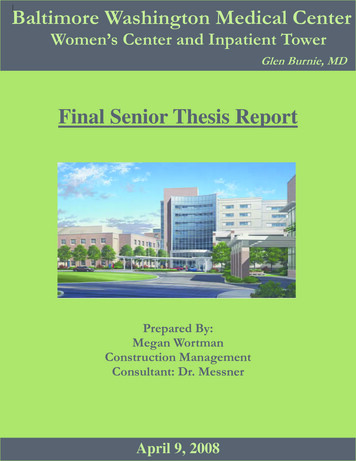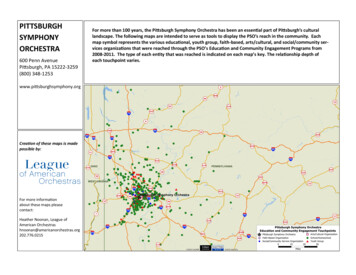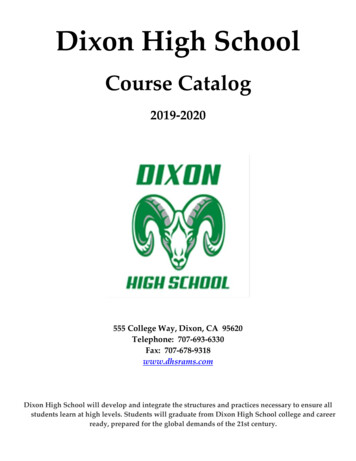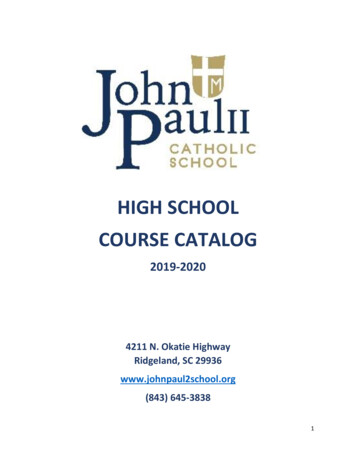
Transcription
HIGH SCHOOLCOURSE CATALOG2019-20204211 N. Okatie HighwayRidgeland, SC 29936www.johnpaul2school.org(843) 645-38381
Course Catalog2019-2020Mission StatementJohn Paul II Catholic School is committed to preparing students with diverse learning abilitiesfor the challenges of life through intellectual, physical, and spiritual programs that advanceacademic excellence, leadership, a healthy lifestyle, and service to others while fosteringdiscipleship according to the traditions of the Catholic faith.PhilosophyAs a Catholic diocesan school, John Paul II participates in an established tradition of faithformation, community engagement, and academic excellence where the dignity of everyperson is recognized. To fulfill our mission as community educators, teaching methods aredesigned to reach a wide range of abilities and circumstances. Education is viewed as a holisticprocess that utilizes a faith community of parents, pastors, and faculty to model Christianbehavior and encourage intellectual curiosity. This holistic approach creates confident,reflective, and engaged students who are prepared to meet contemporary issues with a globalperspective that reflects Catholic moral teachings.Academic ProgramThe college preparatory curriculum of John Paul II is offered at three instructional levels:College Preparatory (CP), Honors, or AP/College Credit. Academic Administrators reserve theright to place students in the appropriate level course based on standardized test scores andprevious academic performance. Courses offered at John Paul II create a foundation forstudents to be successful in college and life. On completion of the twelfth grade students areawarded a certificate of graduation provided he or she fulfill minimum graduationrequirements from John Paul II Catholic School.2
Graduation RequirementsJohn Paul II Catholic School (JPII) is a diocesan secondary school accredited by AdvancEd(formerly the Southern Association of Schools and Colleges) and is a member of the SouthCarolina Independent School Association (SCISA). It is the responsibility of each student to meetthe standards for high school graduation set by John Paul II Catholic School, the Diocese ofCharleston, and the South Carolina Department of Education. To receive a JPII diploma,students must complete eight semesters of high school, attend the Senior Retreat, and earn thefollowing credits:Current Graduation RequirementsGraduation Requirements Beginningwith the Class of 2019CreditsAcademic DisciplineCreditsAcademic l Studies53Social Studies53World Languages 63World Languages60.5Health0.5Health0.5Physical Education 70.5Physical Education 71Technology1Technology1Fine Arts1Fine Arts3Elective83.5Elective828Total Credits Required29Total Credits Required1. A theology course is required each year a student attends JPII.2.3.4.5.6.7.8.An English course is required each year in grades 9-12. The 4 credits must include English I, English II, English III or APLanguage and Composition, English IV or AP Literature & Composition.A mathematics course is required each year in grades 9-12. The courses must include Algebra I, Geometry, Algebra II,and one additional course beyond Algebra II.Courses must include Biology and Chemistry or Physics. Some colleges and universities now require 4 years of labsciences.Courses must include U.S. History or AP U.S. History, U.S. Government or AP U.S. Government, and Economics.Must be the same foreign language.A student may earn a maximum of 0.5 credits in P.E. by participating in a JPII team sport.Credits earned beyond the minimum requirements listed will fulfill the Electives requirement. Additional courses in allsubjects will be considered Electives.In addition to the above academic requirements, a graduate of John Paul II Catholic Schoolmust complete the required number of service hours and complete his or her Senior Project.College CounselingCollege Board School Code: 411674JPII offers a full service Counseling Office that is available to help students with coursescheduling, college selection, college applications, standardized testing, and transcripts.Students and parents are introduced to the Counseling Office's services as freshmen withformal and individualized services beginning in the junior year. Upperclassmen should see thecounselor on a regular basis as they begin to make college selections.3
Grading PolicyUnder South Carolina state guidelines, the cumulative GPA (Grade Point Average) reported onthe final transcripts of students who are attending colleges and universities in the state ofSouth Carolina will be calculated using the South Carolina Uniform 10-point Grading Scale,which is used to determine each student’s eligibility for the SC Lottery-funded scholarships. Thetranscript will also show the student’s cumulative GPA on the John Paul II grading scale.South Carolina Uniform 10-Point Grading BBBBBBBBCCCCCCCCCCDDDDDDDDDDFFFFFFFFFFAcademic Track(College 00.8000.7000.6000.500AP orCollege 01.1001.000John Paul II Grading 0.0000.0000.000AP or 3000.2000.1000.0004
Cumulative GPAJohn Paul II Catholic School calculates two cumulative GPAs to be reported on the students’ transcriptsat the end of the school year.The first is based on the SCUGP which is considered in awarding Palmetto Fellows, LIFE, and HOPEscholarships. Under South Carolina state guidelines, the cumulative GPA reported on the final transcriptsis calculated using the SCUGS 10 point scale above. This 10 point SCUGS is in the process of beingtransitioned to full use in the following manner:a) Class of 2017 is a ratio of 3:1 – 3 years calculated using the previous SCUGS 7 point scale: 1year (2017) calculated using the SCUGS 10 point scale.b) Class of 2018 is a ratio of 2:2c) Class of 2019 is a ratio of 1:3d) Class of 2020 is the first class to have fully implemented the SCUGS 10 point scale incalculating the Cumulative GPA for final transcripts.The second is the John Paul II Catholic School GPA based on the grading scale found above.Class RankClass rank is determined by the cumulative grade point average calculated at the end of theacademic year during the student’s ninth through twelfth grade years. All high school coursestaken during middle school and listed on the high school transcript are also calculated. All highschool credit courses are used in calculating the GPA. John Paul II Catholic School calculatesclass rank at the end of each school year for all students in grades nine through twelve. Becauseof the size and academically-competitive nature of our student body, the school does notdisclose rank to colleges during the college application process unless specifically requested.High School Credits Earned In Middle SchoolCurrently at John Paul II, middle school students may earn high school credits in both math andworld languages. Credit earned in eligible courses will be included on the student’s high schooltranscript and will be used to calculate his or her cumulative GPA unless the students elects toretake the course upon entering ninth grade. If the student chooses to retake a course, only theretake grade will be used in figuring the student’s GPA, and only the retake attempt will appearon the transcript. This policy will apply whether the retake grade is higher or lower than thegrade the student previously earned. This policy is implemented to allow higher achievingstudents the opportunity to schedule advanced math courses in high school. It does not permita student to complete his or her math requirements early. Regardless of the number of highschool math credits earned in middle school a student is required to enroll in at least onemathematics course each year in grades 9 - 12.5
Transfer CreditsGrades of students transferring to JPII from an accredited secondary institution outside ofSouth Carolina will be converted to correspond with the South Carolina Uniform Grading Policy(SCUGP). If numerical averages are provided, those averages must be used in converting thegrades to the student’s JPII record. If letter grades with no numerical averages are provided,this conversion will apply: A 96, B 88, C 80, D 73, F 61. If the transcript shows that thestudent has earned a grade of P (passing), that grade will be converted to a numericaldesignation on the basis of information secured from the sending institution as to theappropriate numerical value of the P. If no numerical average can be obtained from the sendinginstitution, the student’s cumulative transfer GPA will be calculated and the correspondingnumber equivalent will be assigned to replace the P.Policy Governing Repeating a Course for Which Credit Was EarnedStudents in grades nine through twelve may retake a course that they have previously receivedcredit at JPII or another institution if they earned a D or an F in that course. The course must beat the same level of difficulty and the retake must be completed prior to the end of the nextacademic year and before the student enrolls in the next sequential course. If a student fails arequired course it must be retaken in order for the student to gain the needed credits forgraduation.The course may be taken at JPII or through an administratively approved service. If the studentreceives permission from school administration to retake the course with an approved outsideprovider, the parents or guardian and student must sign a binding contract that stipulatesprovider, course, payment, and recording details.The earned retake grade will not replace the student’s previous earned grade. The student’sofficial transcript and cumulative GPA will reflect all courses taken and all grades earned ingrades nine through twelve.Students who fail one or more required courses for graduation may not be invited to return toJohn Paul II Catholic School.6
Policy Governing Honors CoursesHonors courses usually offer the same curriculum as regular courses but are more demanding,requiring in-depth study of content, completion of extra projects, and learning at anaccelerated pace. Grades for honors courses are weighted more than regular courses but lessthan AP and College Credit courses, as mandated by the South Carolina Uniform Grading Policy.Students who wish to challenge themselves with an honors course should consider thedemanding nature of the course and grades earned in previous courses in the subject areabefore requesting admission to the course.Seventh grade students who are new to JPII must sit for a placement test. These tests results,along with incoming assessment scores, grades, and an interview, will be utilized by JPIIadministration to determine academic placement.Policy Governing Advanced PlacementAdvanced Placement (AP) is a program created by the College Board which offers college-levelcurricula and examinations to high school students. American colleges and universities maygrant placement and course credit to students who obtain high scores on the examinations. TheAP curriculum for each of the various subjects is created for the College Board by a panel ofexperts and college-level educators in that field of study. For a high school course to have thedesignation, the course must be audited by the College Board to ascertain that it satisfies theAP curriculum. If the course is approved, the school may use the AP designation.AP classes can be as challenging as introductory college courses. They are fast-paced, covermore material than regular classes, and require independent work like research and analysis.Some AP classes have recommended courses which a student should take first, and all APcourses require that a student is willing to do his or her best work. Getting a dose of a collegelevel curriculum early on can ease the transition from high school to college. Taking AP is a signthat a student is willing to take on the academic challenge of college-level work andexpectations.Each Advanced Placement course culminates in a corresponding AP exam which is centrallyscored by Advanced Placement teachers and college instructors from around the world. Thefamilies of AP students will be financially responsible for the 100 fee incurred for each APexam administered.Grades for AP classes are weighted the same as College Credit courses, as mandated by theSouth Carolina Uniform Grading Policy.7
Policy Governing Online CoursesOnline courses can be a good choice for students who wish to expand study in subjects that are,for one of the reasons listed here, unavailable to the student at John Paul II. Since onlinecourses are treated as independent study, students approved for online courses mustdemonstrate effective organizational skills and the ability to work independently. Onlineschools must meet the standards of John Paul II’s academic program. Students and theirfamilies will be responsible for any financial obligation associated with online courses unless JPIIadministration directly publishes otherwise. Students must petition the Academic Dean and thePrincipal for course approval. Upon approval, students, parents or guardians and the Principalmust sign an agreement that stipulates provider, course, grade acceptance, creditacknowledgement, and payment specifics. Students petitioning for online eligibility mustdemonstrate one of the following criteria:1. Students experiencing schedule impediments that cannot be rectified at John Paul II andmay cause delays in completing necessary requirements for graduation may take anapproved online course for credit.2. Students who have advanced beyond a subject level currently offered at John Paul IImay take approved online courses.3. Students who wish to take a course not offered at John Paul II but who have either metor will meet projected credits necessary for graduation, may take an approved onlinecourse.4. Students who wish to retake a course for which they made a “D” or an “F” may takeapproved online summer courses for credit.Grades from the online institutions may be accepted at JPII for graduation credit pending JPIIadministrative approval. Administration at JPII reserves the right to determine theappropriateness of the online course/school. The following rules will apply to the courses thatare approved and the grades/credit which will result in such partnering.1. Students, parents or guardians, and the Principal will sign a Grade AcknowledgmentWaiver that informs the student of course grade implication and binds the student tocourse grade acceptance.2. The Carnegie Units assigned to a selected course are designated by the Principal beforecourse approval and specified in the Grade Acknowledgement Waiver.3. Courses from Administrative Approved Institutions will clearly designate Academic andNCAA accreditation on the Grade Acknowledgement Waiver. Some courses do not carrythese designations and understanding the implications of choice is the student/parentresponsibility.4. JPII will not assume responsibility for course outcome. Students and their parents orguardians must understand all implications of course grades and waive JPII responsibilityif the student does not perform well.8
5. A partner teacher or academic dean will meet occasionally with the student to monitorstudent progress.6. The academic dean or partner teachers are responsible for submitting grades that thestudent has received according to the assessments given by the on-line course.Policy Governing Dual Enrollment/College Credit CoursesStudents who meet eligibility requirements may petition the administration for permission toenroll in courses at the University of South Carolina Beaufort or the Technical College of theLowcountry for both college credit and high school credit. In order to be considered for highschool credit, the specific course(s) must be preapproved by JPII administration before thestudent enrolls in the course. A maximum of 4 Carnegie units earned through Dual Enrollmentmay be included on a student’s JPII transcript. A traditional 3 credit hour semester collegecourse shall transfer as a ½ Carnegie unit (½ high school credit). It is the student’s responsibilityto ensure that all requirements of the college are met and that an official transcript with thefinal grade is sent to JPII by January 15th for fall courses, and May 30th for spring courses.Students must carefully consider their abilities to manage a Dual Enrollment Course.Furthermore, students and parents or guardians must understand the negative consequencesthat poor course performance will have on GPA and federal aid packages. Students who dualenroll will carry that grade into both their high school GPA and transcript as well as their collegeGPA and transcript. Poor performance will create a low college GPA and may affect thestudent’s access to federal aid and specific programs of study when entering college. JPII doesnot bear responsibility for student performance.Each college employs specific guidelines for accepting credit from other institutions. Studentsand their parents or guardians must understand that credit received in this manner is notguaranteed to transfer to another institution. The student is responsible for discovering if andhow the college credit earned through dual enrollment will transfer to the post-secondaryinstitution he or she ultimately attends.Students will be eligible to enroll in dual/college credit courses if the following criteria are met:1. Students must be in good academic and financial standing at JPII.2. Students must meet all the enrollment requirements of the specific college’s dualenrollment program.3. Students have completed or will complete all required courses for graduation at JPII.4. The course is not currently offered at JPII.5. Students, parents or guardians, and the Principal sign a Grade Acknowledgment Waiverthat: informs the student of course grade implication, binds the student to course gradeacceptance, notifies the student of potential non-credit when transferring outside of thecourse institution, waives JPII of responsibility if the student does not perform well.9
Theology (Religion)TH-211: Freshman TheologyGrade: 9Full Year1 Graduation CreditPrerequisite: NoneThe purpose of this course is to give an overview of Sacred Scripture with an introduction to thebasic principles for understanding and interpreting the Bible. Students will be introduced to thehistorical background of the salvation history, theological terms and discussions on the Old andthe New Testament. Students continue to develop their personal prayer life and liturgical lifewith a particular emphasis on the scriptural foundation of these practices. Students will beengaged in essential Christian practices including pro-life activities and service projects, leadingthem to grow in intentional discipleship.TH-221: Sophomore TheologyGrade: 10Full Year1 Graduation CreditPrerequisite: NoneThe purpose of this course is to supply the students with a general knowledge of the Church’shistory from Apostolic times to the present. They will be introduced to the fact that the Churchwas founded by Christ through the Apostles and is sustained by him throughout history throughthe Holy Spirit. The students will come to know that the Church is the living Body of Christtoday and, as such, has both Divine and human elements. In this course, students will learnabout the Church’s 2000 years of history and about how the Church is led and governed by thesuccessors of the Apostles. Students will be engaged in essential Christian practices includingpro-life activities and service projects, leading them to grow in intentional discipleship.TH-231: Junior TheologyGrade: 11Full Year1 Graduation CreditPrerequisite: NoneThe first semester focuses on Christina Morality and is designed to assist students in theprocess of reflecting upon and cherishing his or her dignity and that of other persons as madein the image and likeness of God and reflecting faithfully that image in a life conformed to newlife in Christ. To do so, we will examine the foundations of Christian morality, use theBeatitudes and Decalogue (Ten Commandments) as a guide for making moral decisions, take anin-depth look at moral decision making, and discuss the intrinsic connection between Christianmorality and authentic human development. Students will be engaged in essential Christianpractices including pro-life activities and service projects, leading them to grow in intentionaldiscipleship.10
The second semester introduces students to the Church’s social teachings. In this coursestudents are to learn how Christ’s concern for others, especially the poor and needy, is presenttoday in the Church’s social teaching and mission. The student will recognize and understandthe obligation of every Christian to actively live out these principles in their everyday life.Students will be engaged in essential Christian practices including pro-life activities and serviceprojects, leading them to grow in intentional discipleship.TH-241: Senior TheologyGrade: 12Full Year1 Graduation CreditPrerequisite: NoneThe first semester focuses on World Religions. The purpose of this course is to help thestudents understand the manner in which the Catholic Church relates to non-Catholic Christiansas well as to other religions of the world. Building on the foundational truth that Jesus Christestablished the Catholic Church and entrusted to her the fullness of God’s Revelation, thecourse is intended to help students to recognize the ways in which important spiritual truthscan also be found in non-Catholic Christian churches and ecclesial communities as well as innon-Christian religions. It is also intended to help students recognize the ways in which othersystems of belief and practice relate to and differ from the Catholic faith. Students will beengaged in essential Christian practices including pro-life activities and service projects, leadingthem to grow in intentional discipleship.The second semester focuses on Apologetics and the Existence of God. The purpose of thiscourse is to help the students to be able to "give a reason for the hope that is in you," andintended to challenge the student in the development toward a mature faith. Every Catholichas the duty to investigate the reasonableness of the faith and be prepared to explain it toothers. Through the study of the philosophical and rational basis of the faith, in conjunctionwith the study of Sacred Scripture and Sacred Tradition, the student will be sufficientlyprepared to defend and explain the Truth of the Catholic Church. Students will also beintroduced to Ecumenism in order to understand the relationship between the Catholic Church,Orthodox and Christian denominations. Students will be engaged in essential Christianpractices including pro-life activities and service projects, leading them to grow in intentionaldiscipleship.11
MS-7-20: 7th Grade ReligionGrade: 7Full Year0 Graduation CreditThis course introduces students to the Catholic faith and Catholic traditions. Students are firstintroduced to the Catholic foundation of the school community, focusing on the celebration ofthe Eucharist, life and spirituality of Pope St. John Paul II, and history and traditions of John PaulII Catholic School. Following the structure of the Catechism of the Catholic Church, students alsoexplore aspects of the Nicene Creed, the Liturgy and Sacraments, Christian morality, andprayer. Students will be engaged in essential Christian practices of prayer and communityservice, leading them to grow in intentional discipleship.MS-8-20: 8th Grade ReligionGrade: 8Full Year0 Graduation CreditThis course engages students more deeply into the Catholic faith and Catholic traditions.Students further explore aspects of the Nicene Creed, the Liturgy and Sacraments, Christianmorality, and prayer. Continuing to examine Pope St. John Paul II’s spirituality, Students focuson his teaching of the Theology of the Body. Students will be engaged in essential Christianpractices of prayer and community service, leading them to grow in intentional discipleship.12
English Language ArtsCore CoursesEN-811: English I – Literature and CompositionGrade: 9Full Year1 Graduation CreditPrerequisite: NoneStudents engage in critical reading, writing and thinking through exposure to literature and avariety of non-fiction and informational readings. Novels will include those covered as a classand those selected for independent study that will culminate in a project or paper to illustratethorough analysis. In-class writing workshops with modeling and use of anchor texts, willdevelop the writing process through skills in grammar, vocabulary and mechanics. Formalgraded writing assignments will include narrative, expository, descriptive essays and a researchpaper utilizing sources.EN-812: Honors English I – Literature and CompositionGrade: 9Full Year1 Graduation CreditPrerequisites: Qualifying scores on the PSAT, and/or middle school English course.Students engage in critical reading, writing and thinking through exposure to literature and avariety of non-fiction and informational readings. Novels will include those covered as a classand those selected for independent study that will culminate in a project or paper to illustratein-depth analysis. In-class writing workshops will develop a scholarly writing process and covera diverse range of writing styles and purposes to develop advanced skills in grammar,vocabulary and mechanics. Formal graded writing assignments will include narrative,expository, descriptive essay, and a research paper utilizing sources and culminating in a formalclass presentation.EN-821: English II –Composition and Select ReadingsGrade: 10Full Year1 Graduation CreditthPrerequisites: 9 Grade EnglishStudents engage in critical reading, writing, and thinking through exposure to English-languageor world literature translated into English, non-fiction and informational readings. In-classwriting workshops will develop a scholarly writing process and skills in grammar, vocabulary,and mechanics. Formal graded writing assignments will include narrative, expository,descriptive, and persuasive essays, and a research paper utilizing sources.13
EN-822: Honors English II – Composition and Select ReadingsGrade: 10Full Year1 Graduation CreditthPrerequisites: Qualifying scores on the PSAT and/or 9 grade English course.Students will engage in critical reading, writing, and thinking through exposure to the variousgenres of English-language literature or literature translated into English including the novel,short story, poetry, and drama. Course material will also cover a wide variety of non-fiction andinformational readings in class and through independent study and projects. In-class writingworkshops will develop a scholarly writing process, cover a diverse range of writing styles andpurposes in order to develop advanced skills in grammar, vocabulary and mechanics. Formalgraded writing assignments will include narrative, expository, descriptive and persuasive essays,a research paper utilizing sources and class presentations on selected topics.EN-831: English III – Survey of American LiteratureGrade: 11Full Year1 Graduation CreditthPrerequisites: 10 grade EnglishAmerican novels, poetry, plays, and short stories will be explored. Students will learn toanalyze each genre using literary terms, point of view, structure and language. Classroomdiscussion will articulate how the works reflect the American experience. Written work willreflect student analysis of style, purpose, and theme. Extended writing assignments will refinestudents’ skills in expository and creative writing as well as research.EN-832: Honors English III – Survey of American LiteratureGrade: 11Full Year1 Graduation CreditthPrerequisites: Qualifying scores on the PSAT and/or 10 grade English course.American novels, poetry, plays, and short stories will be explored in depth. Students willanalyze not only the different genres, but also their common American experience. Writingassignments will reflect literary and personal analysis and refine skills in expository and
1. A theology course is required each year a student attends JPII. 2. An English course is required each year in grades 9-12. The 4 credits must include English I, English II, English III or AP Language and Composition, English IV or AP Literature & Composition. 3. A mathematics course is required each year in grades 9-12.
